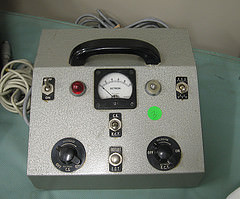
An online article by WebMD states:
"For most people, the term 'shock treatment' conjures Hollywood-inspired images of torture. Hard-to-watch scenes from movies like A Beautiful Mind and One Flew Over the Cuckoo's Nest give the impression that the therapy is a primitive throwback to a time when clinicians had little to offer their depressed patients.
But electroconvulsive therapy (ECT) is still being used -- more in Europe than the United States -- and it may be the most effective short-term treatment for some patients with depressive symptoms, a newly published review in the journal The Lancet suggests. Researchers concluded that ECT remains an important treatment option for the management of severe depression.
'Despite its image, ECT is a sophisticated and complex treatment that can be especially useful in patients who are not helped by drug therapy,' researcher John Geddes, MD, of the University of Oxford in England, tells WebMD. 'But clinicians who give it need to be well trained, and the treatment needs to be tailored to the individual patient.'
The patient most likely to benefit from electroconvulsive therapy is one who is severely depressed, has not responded to drugs, and is suicidal, says well-known psychiatrist and ECT advocate E. Fuller Torrey, MD. Simply changing this patient's medication may not be enough if the patient is an immediate danger to himself. Torrey is the executive director of the Stanley Medical Research Institute in Bethesda, Md.
'ECT can literally be lifesaving for someone in this situation because it works almost immediately,' he tells WebMD. 'It takes a week or so to determine if a drug is going to work, so you can put someone on a drug on Monday, but they may hang themselves on Wednesday.'
Other patients who may benefit include those in the depressed phase of bipolar disorder who have not responded to other treatments and possibly certain schizophrenic patients who are not helped by drugs.
Torrey says electroconvulsive therapy is underutilized in the United States because it is still widely perceived by the public as 'something akin to a medieval torture.'That image has been fostered, he say, by well-funded opponents of ECT and psychiatry in general and by inaccurate Hollywood portrayals of the procedure, which typically show patients writhing in agony. In real life, ECT is done under general anesthesia so patients are unconscious during treatment."
http://www.webmd.com/depression/news/20030306/shock-therapy-still-here-still-used
So, don't be fooled by Hollywood's attempt to make ECT into something used for torture. If someone were using electric shock on a person it would be considered torture, not a medical treatment. Let's keep our facts straight and reduce stigma.
So, don't be fooled by Hollywood's attempt to make ECT into something used for torture. If someone were using electric shock on a person it would be considered torture, not a medical treatment. Let's keep our facts straight and reduce stigma.
 RSS Feed
RSS Feed